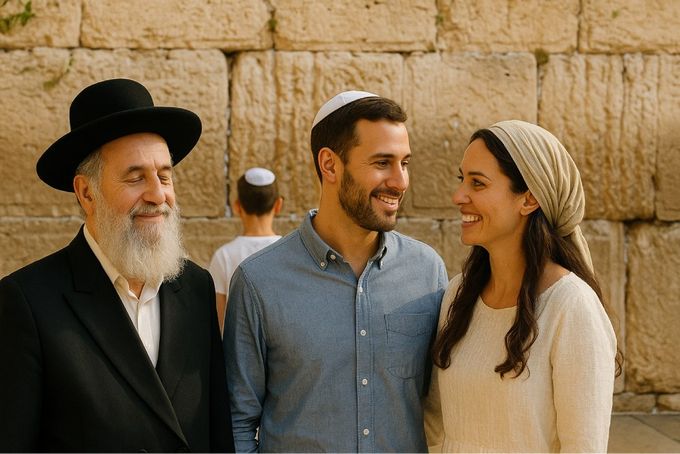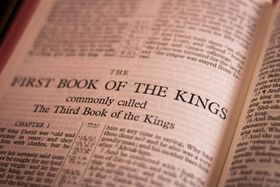5 Israeli Traditions & Customs & Their Meaning
Have you ever walked the storied streets of Bethlehem or prayed beside the Sea of Galilee and wondered how Israel’s ancient rituals breathe life into the Christian faith?
Updated April 29, 2025

For Christians worldwide, Israel’s traditions—from the blast of the shofar on Rosh Hashanah to the solemn fast of Yom Kippur—can seem distant, even though they are woven into the very fabric of the Bible.
You could be standing in Jerusalem during Passover, reciting Psalms of deliverance, yet missing how the Lamb’s blood on ancient doorposts foreshadowed the ultimate sacrifice of the Cross.
Below, we’ll uncover how Israeli traditions and customs are living testimonies to a divine narrative that binds the Israeli Culture.
» Honor Israeli customs and traditions with hand-crafted Holy Land items
3 Key Forces that Shaped the Israeli Culture
1. The Babylonian Exile
The Babylonian Exile (586–538 BCE) was a defining moment for Jewish culture, which forms the bedrock of modern Israeli identity. When the Babylonians destroyed the First Temple and exiled many Jews, traditional temple-based worship was no longer possible.
In response, Jews developed synagogue gatherings and placed a greater emphasis on scripture study. These practices became central to Jewish life and remain a cornerstone of Israeli culture today.
The Exile also sparked the Jewish diaspora, spreading communities worldwide. This scattering enriched Jewish traditions with diverse influences, many of which are still reflected in Israeli customs and traditions.
» Learn more about the Christmas traditions around the world
2. Early Christian Persecution
The persecution of early Christians in the 1st and 2nd centuries CE didn’t directly shape Jewish Israeli culture, but it set the stage for a broader cultural shift in the region.
As Christians faced hardship, their faith spread beyond Judea, eventually taking root in the land that would become Israel. Over time, this led to the establishment of Christian communities and the construction of churches.
These developments added a new layer to the region’s cultural fabric, introducing Christian traditions, like Easter and Christmas, that coexist with Jewish practices in Israel today.
» Journey through time: Read about the two southern tribes of Israel
3. Legalization of Christianity
The legalization of Christianity under emperors Constantine (313 CE) and Theodosius (380 CE) marked a turning point for the region’s cultural identity.
With Christianity first tolerated and then declared the Roman Empire’s official religion, the area saw an influx of churches, monasteries, and Christian pilgrims. This shift included Christian holidays, architecture, and practices in society.
In modern Israel, this legacy is evident in the presence of historic Christian sites, like the Church of the Holy Sepulchre, and the small but vibrant Christian population that contributes to the nation’s cultural diversity.
» Learn more about the tradition of making Israeli pottery
5 Important Israeli Traditions and Customs
1. Israeli Traditional Clothing
Israel's traditional clothing, especially among Orthodox Jewish communities, reflects timeless Biblical commands about modesty and identity
But why do traditional Jewish clothes look so distinct? It all starts with God’s command to the Israelites in Deuteronomy 22—to dress differently as His people. The idea was to stand out and keep their focus on God, not idols.
These rules still shape Jewish life in Israel today. Here’s what you might see:
- Kippah: A small skullcap worn by men to show reverence for God.
- Tallit: A prayer shawl men wear during services at a synagogue (a Jewish place of worship), though some women do too in certain communities.
- Hair Covering: Married women often cover their hair, a nod to modesty and tradition.
Not every Jew wears these today, but for those who do, it’s a way to keep history alive. These garments remind Jewish people of their special covenant with God, a promise to live differently. In Israel, they’re a living link to the past.
And while Christians might not wear kippahs or tallits, the ideas of modesty and honoring God might feel familiar, showing how faith can shape how we show up in the world.
» Discover what you should wear while in Israel
2. Shabbat
Among the most cherished Israel holidays and traditions, Shabbat holds a special place as a weekly celebration of rest and connection.
Shabbat is the Jewish day of rest, starting every Friday evening and lasting until Saturday evening. It’s a time to rest, gather with family and friends, and focus on worship and reflection.
For many Jews, it’s the heartbeat of the week—a chance to reconnect with loved ones and with God. At the center of Shabbat is a special meal that kicks off the day of rest.
Here’s what you might find on the table:
Kiddush wine: This isn’t just any wine—it’s blessed to sanctify the start of Shabbat, marking the day as holy.
Challah bread: A braided loaf that’s as delicious as it is symbolic, representing unity and the double portion of manna God provided in the wilderness.
The meal itself: More than just food, it’s a time for connection. Jews come together to share stories, sing songs, and remember their heritage.
The way Jews treat each other and their guests during Shabbat is all about respect and hospitality. It’s a moment to strengthen bonds and honor the past, making it a feast for both the body and the soul.
Browse Our Selection of Israeli Spices:
3. Traditional Israeli Wedding Ceremonies
When exploring ceremonies in Israel, few are as symbolic and beautiful as the traditional Jewish wedding In ancient times, Jewish weddings were different, reflecting the customs of their day:
Arranged Marriages: Parents often arranged the match, uniting families with purpose and prayer.
Dowries: The bride’s father received a dowry for his daughter while sending one for his sons, sealing the bond between households.
The Waiting Bride: Biblical accounts, like Rebekah awaiting Isaac or Rachel waiting for Jacob, highlight the bride’s hopeful anticipation for her groom—a picture of trust and commitment.
Today, Jewish weddings in Israel carry forward this legacy with meaningful rituals:
Ketubah (Marriage Contract): The groom signs this promise to honor and provide for his bride, a vow rooted in love and responsibility.
Huppah (Wedding Canopy): Standing beneath this canopy, the couple enters their new life together, blessed by God’s presence.
The Ring: The groom places a simple ring on the bride’s finger, symbolizing eternal devotion.
Breaking of Glass: At the close, the groom crushes a glass underfoot. While some tie this to the Temple’s destruction, a precious interpretation is that it reflects two souls, once separate, becoming one, united by God’s design.
Across time, Jewish weddings reveal core values of Israeli culture. They unite families and friends in joy. Rituals like the huppah and ketubah reflect the sacred history of God’s people, a heritage Christians also hold dear.
These ceremonies also preserve Jewish culture, passing down traditions that honor the past while embracing the future.
» Learn more about Sukkot, the Festival of Tabernacles and it's importance
4. Hannukah and Passover
Hanukkah and Passover are two of the most important festivals in Jewish tradition. They don’t just mark historical events—they help keep the story of faith alive across generations.
Hanukkah celebrates the rededication of the Second Temple after the Maccabean Revolt, highlighting God’s faithfulness and the triumph of light over darkness. Though it falls near Christmas, its meaning is distinct, focused on perseverance and devotion.
Passover recalls God's deliverance of the Israelites from slavery in Egypt. The blood of a spotless lamb marked homes for protection, a powerful symbol of salvation and freedom that still speaks today.
For Christians, Passover points to the death and resurrection of Jesus Christ, the true Passover Lamb. The breaking of bread at the Last Supper connects believers to ancient traditions and God’s redeeming work.
While these festivals are deeply rooted in Jewish history, their message of God’s faithfulness and deliverance reaches far beyond, calling all of us to remember, give thanks, and trust in His promises.
» Check out the differences between Passover and Easter
5. Greetings and Hospitality
In Israel, greetings are genuine and heartfelt. A handshake is the usual way to meet someone new, while close friends and family often greet each other with a hug or a kiss on the cheek.
The word "Shalom"—meaning peace—carries deep meaning. It's not just a hello or goodbye, but a blessing of peace and well-being.
Hospitality is woven into everyday life. Guests are welcomed warmly and almost always offered coffee, tea, or a meal. Sharing food isn't just a social custom; it’s a way of showing honor and kindness, echoing the hospitality seen throughout the Bible.
Whether you're meeting someone on the street or sitting around a family table, you quickly sense that welcoming others is more than a tradition — it’s part of the heart of the culture.
» Discover the traditional Israeli breakfast dishes
Embracing Israel’s Legacy as Christians
Israel’s traditions are far more than artifacts—they are living echoes of God’s faithfulness, preserved across millennia to reveal the Christian journey.
From the Passover Seder, which foreshadowed Christ’s sacrifice, to the shofar’s blast, heralding His return, these customs anchor us in a story that began in Abraham’s tent and culminates in the New Jerusalem.
To walk closer to these truths, immerse yourself in tangible reminders of the Holy Land. Artza curates beautifully crafted items—from olive wood Scripture carvings to hand-painted Bethlehem ceramics—that connect you to the land where Jesus walked.
Each piece is more than a souvenir; it’s a tool for prayer, study, and worship, bringing the textures of Israeli tradition into your home. Explore their collections to deepen your connection to the places and practices that shaped our faith.








